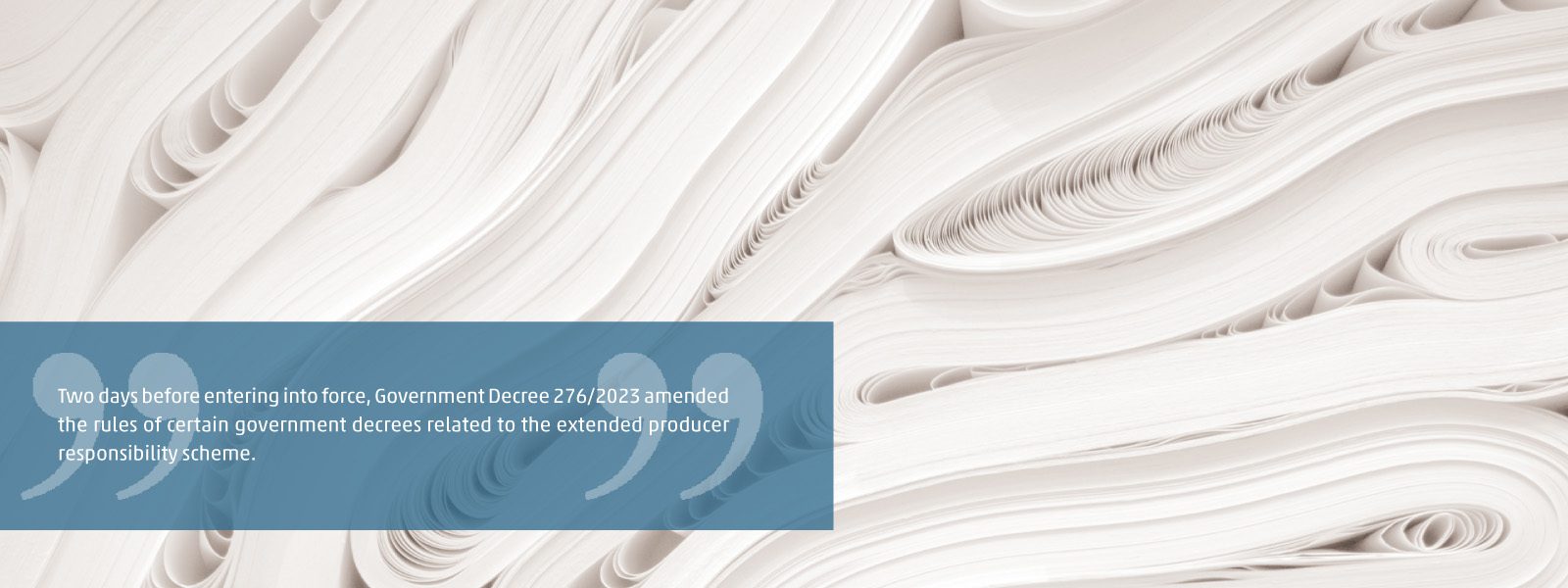The EPR decree, i.e. Government Decree 80/2023 on the detailed rules of the extended producer responsibility scheme, appeared in Hungary on 14 March after months of waiting. Based on the EPR decree most of the companies affected were finally able to perform the necessary registration at MOHU and the National Waste Management Authority, set up their records for circular products, and adjust their invoicing systems to include the invoicing clause – so by the end of June, they felt they could take a breather.
But the last few hot days of June brought a cold shower. On 29 June, two days before entering into force, Government Decree 276/2023 (VI.29) amended the rules of certain government decrees related to the extended producer responsibility scheme, including the EPR decree, in several places. Below we have summarised the main changes to the EPR decree, which, importantly, came into force on 1 July. Those affected should therefore consider the impact of any changes on their business as soon as possible.
Key changes affecting packaging
According to the latest amendments to the EPR decree, the extended producer responsibility obligation for packaging that is made from packaging designed and intended for filling at the point of sale to the consumer – and packaging made from single-use packaging sold, filled or designed and intended to be filled at the point of sale to the consumer – is imposed on the manufacturer of the packaging, instead of the entity selling the packaging to the producer of the packaging.
Changes affecting reusable packaging
Thanks to the new amendments, an option similar to the product fee scheme and beneficial for stakeholders was introduced to the EPR decree from 1 July. Accordingly, final separation from the product of reusable packaging that is part of packaging imported from abroad does not constitute use for own purposes and therefore does not give rise to an EPR obligation, if the reusable packaging is verifiably returned to the foreign country within 365 days of the obligation arising. The legislator also clarified that delivery abroad can be certified by a transport document or a waybill.
The amendments also clarify that, for the final separation of reusable packaging owned by a Hungarian economic operator and returned from abroad, reusable packaging shall mean packaging included in the register of reusable packaging at the National Waste Management Authority.
Another positive change for manufacturers of reusable packaging is that, with the exception of the placing on the Hungarian market of packaging made for the first time from reusable packaging, manufacturers do not have to pay the extended producer responsibility fee for the placing on the market of packaging made from reusable packaging material if the reusable packaging used to produce the packaging is included in the National Waste Management Authority’s register of reusable packaging.
Amendments relating to assuming contractual obligations
From 1 July, not only vehicle manufacturers but also farmer organisations will be able to take advantage of the option to assume contractual obligations. In the case of a circular product placed on the Hungarian market via a farmer organisation under EU rules, the farmer organisation can take over the EPR obligation. Compared to the previous provisions of the EPR decree, the minimum information content of the associated contracts changed in the legislation as of 1 July.
A further change from the previous provisions of the EPR decree is that when assuming contractual obligations, the vehicle manufacturer is entitled to a flat-rate payment, and this selection cannot be changed within the given year.
Taking to stock: new rule in EPR decree
The possibility of taking to stock was added to the EPR decree, presumably to ensure consistency with the product fee legislation. Accordingly, the producer is entitled to keep records on the circular products taken to stock instead of circular products placed on the market, but may not change this selection within the given quarter.
Subsequent changes to data reporting
The previous wording of the EPR decree gave those affected a relatively short time to amend their data reporting. This is because only 15 days were given from receipt of the EPR fee invoice issued by the concession company to make any changes. This deadline has now been extended slightly: under the new rules, manufacturers, concession companies and concession subcontractors may amend the data submitted for each quarter of the given year until 31 March of the year following said year at the latest.
Change to invoice clause
Thanks to last-minute amendments to the EPR decree in Hungary, those placing circular goods on the Hungarian market in the context of a retail sale are exempt from the obligation to add clauses to their invoices.
Statement-based exemption
The amendments clarified the relevant part of the EPR decree, since the previous wording could be construed as meaning the customer must ship at least 60% of the circular product abroad when providing a statement. Under the new legislation, no extended producer responsibility fee must be paid if the customer of the fee-paying manufacturer declares and verifies that at least 60% of the purchased circular product is delivered abroad, either separately or as part of another product. Another change is that delivery abroad can be certified by a transport document or a waybill in the future, and no invoice or other document proving completion of the transaction is required.
Other changes to EPR decree
It is also good to know that, as a result of the amendments, certain annexes to the EPR decree entered into force with different content as of 1 July. Among other things, the circular codes for certain circular products have changed, as well as the part relating to the minimum data content of the registers.
The last-minute changes to the EPR decree could affect the way most economic operators work, so we believe it is important that the next step for the businesses concerned is to review their processes and consider the impact of these amendments on their processes. If you need specialist help with this, please do not hesitate to contact us.











